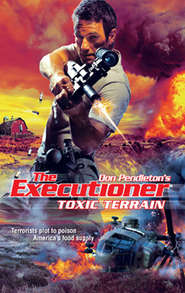По всем вопросам обращайтесь на: info@litportal.ru
(©) 2003-2025.
✖
Road Of Bones
Автор
Год написания книги
2019
Настройки чтения
Размер шрифта
Высота строк
Поля
Looking embarrassed, Anuchin said, “I’ve never driven one.”
“Okay,” Bolan replied. “That limits how much we can pack, keeping the weapons.”
Bolan tried working on the calculation in his head. A trip of thirteen hundred miles on normal roads, with stops for gas and minimal rest, should take about one day at a steady speed of sixty miles per hour. Slow it down for the terrain that Anuchin had described, however, and the clock went out the window. Add the fact that they would almost certainly be hunted, once her enemies—now Bolan’s—found out where they’d gone, and you were looking at a road trip on Route 666.
A little slice of hell on Earth.
The soldier considered it and asked, “When do we start?”
* * *
“I’M WONDERING,” Stephan Levshin said, “whether any of you need to be alive.”
The five men facing him looked nervous, rightly so, since they had failed at what was meant to be a relatively simple task. Although he stood alone before them, and all five of them were armed, Levshin was unafraid. These so-called soldiers were disgraced and dared not lift a hand against the man who pulled their strings.
When his remark produced no comment, only shifting eyes and feet, he said, “You had the targets literally in your sights, but let them slip away. How does that happen? Does anyone care to explain your failure?”
Grudgingly, the leader of the party—Nikolay Milescu—answered. “They went to a charter company,” he said. “We spotted them outside the terminal, but not in time. When we moved in, they drove away.”
“Alerted by the clumsiness of your approach,” Levshin said. “And since you did not have a vehicle nearby, pursuit was hopeless. Right?”
Milescu nodded miserably. “Yes, sir.”
“Which one of you was the sniper?” Levshin asked.
A hand went up. Its rat-faced owner said, “I was,” remembering to add the “sir” a split second too late.
“What is your name?”
“Stolypin, sir. Gennady.”
“Have you practiced with your weapon?” Levshin pressed him.
“I’m familiar with it, sir.”
“What was the range from which you fired this morning?”
“Say one hundred meters, sir,” the sharpshooter replied.
“Using a telescopic sight?”
“Yes, sir,” Stolypin replied.
“And yet, you missed—what was it? Three times?”
“No, sir,” Stolypin said.
“No? You didn’t miss three times?”
“I missed the man, sir. Once, as he was running.”
“And your other two shots? What became of them?”
“I hit the car both times, sir.”
“Did it stop?” Levshin asked.
Stolypin swallowed hard. “No, sir.”
“Another failure, then,” Levshin said. “What shall I tell Moscow, when I am asked if you deserve to be employed? More to the point, if you deserve to live?”
“We can fix it,” Milescu said, sounding desperate.
“How will you do that?” Levshin challenged him. “Invent a time machine and go back to the moment when your idiot incompetence spoiled everything?”
“No, sir,” the gunman said, “but we can find them. We can bring them in or kill them, as you like.”
“So, are you psychic now? If you combine your five pea-brains, can you reach out and tell me where the targets are right now?” Levshin asked.
Milescu swallowed the sarcasm and replied, “They need to get away from Yakutsk, sir. If they can’t fly, that means they have to cross the river. Travel east. There are no airstrips. They must drive to Magadan, and either sail from there or fly from Sokol Airport.”
“And your plan,” Levshin replied, “is…what, exactly?”
“Stop them at the Lena crossing, sir. Or, if we miss them there—”
“Meaning you’ve failed again,” Levshin said, interrupting.
“—then we fly ahead to Magadan and meet them when they get there, sir.”
“I think not,” Levshin said. “If you can’t catch them on the ferry, if that very simple task defeats you, I don’t think that you deserve a flight to Magadan. If that happens—if you should fail again, and your superiors decide to let you live—you’ll follow up and take them on the road. The trip would do you good, I think. Make men of you, perhaps.”
Milescu muttered something that was probably, “Yes, sir,” while his companions stood slump-shouldered, staring at their shoes.
“Go on now,” Levshin ordered. “And if any of you have religion, pray you don’t fuck up again.”
* * *
THE LENA FERRY was a death trap. Bolan knew that if they weren’t ambushed on arrival at the dock, or killed on board, they would find shooters waiting for them on arrival in Nizhny Bestyakh. No matter how he broke it down, they had to find another way across the river.
And with no bridge anywhere nearby, that meant a charter boat.
Another problem: if their enemies had any sense at all, they wouldn’t just stake out the ferry terminal; they’d also have watchers on the Yakutsk waterfront, to head off any end-runs via private boats. That meant contact with a pilot couldn’t happen on the docks.
Where else would they find sailors at that hour of the morning?
“Drinking breakfast,” Anuchin offered. “Vodka is the Russian equalizer.”
There was no shortage of taverns in Yakutsk, as Bolan soon discovered. Bars catering to river boatmen were located near the waterfront, but not directly on the docks, dispensing food and alcohol around the clock as crews departed or arrived on varied schedules. In winter, when the river froze, Bolan supposed they were a place for stranded sailors to commiserate over the tedium of being stuck on shore.











